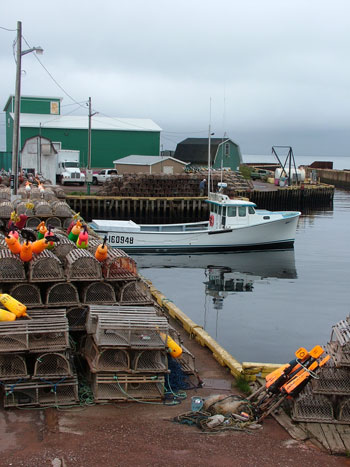The Ruckus Between New Brunswick Fishermen and Processors
by Sandra Dinsmore

Christian Bruns, Executive Secretary of the Maritime Fishermen’s Union in New brunswick said of the 25 cent price subsidy, “The backdrop was to see an industry collapse. It was am exceptionally urgent situation.” LFA 34 representative Ashton Spinney of Nova Scotia said of the New Brunswick fishermen’s blockade, “They just think they’re in their own little world. But without their neighbors to the south (U.S.) they’d be in a world of trouble.” Fishermen's Voice Photo
For over ten years Canadian lobster processors have been trying to convince Canadian fishermen to stop fishing canner size product because there’s practically no market for that smaller size. So the problem New Brunswick fishermen have been having with US shedders is not their quality. According to a New Brunswick lobster processor, the LFA 25 fishermen resent that the processors they sell to are willing to buy market-size shedders from another country, but not to buy canners fished by local fishermen.
After year of argument, some fishermen are ready to stop fishing canners, but others are not, and so it goes, on and on. “Some of the processors that are not financially stable,” the New Brunswick processor said. “They can’t afford to [process canner-size lobster tails] because they have to flip their [finished] products fast, just to collect the money.” (These financially unstable lobster processors are what some dealers and processors refer to as ‘boys’ as opposed to financially stable ‘men.’) These financially unstable ‘boys’, the processor said, are flipping the market-size tails faster because they can sell that larger size more quickly. “So what they have in their mind is, “ the processor said, “they can’t process the smaller tails because they don’t have the money to put them in inventory, so they don’t want to [process] the canners from the [Canadian] Maritimes because the market for them is soft.”
But he says the fishermen who sell to these processors are complaining, “How can you leave us hanging? You [process] lobster from other countries, but you won’t do ours.” (Some processors were refusing to buy any lobsters, no matter the size.) That’s why the LFA 25 fishermen got mad at seeing those tractor-trailers filled with US shedders. That’s why the local fishermen blockaded some New Brunswick processing plants. And that’s why some fishermen made threats to processing facility employees, and why some plant owners moved their families to hotels to keep them safe.
The New Brunswick processor buys from about thirty local boats, and stated, “I’m looking after my boats.” (He said he was going to buy their canner size product, whether he could sell it quickly or not.) “They’ve been selling to me for twenty-five years,” he said, “and if American quality’s soft, so be it. I’m going to get through this year. Maybe next year America will be good.
“If everybody had just stood their ground and taken [bought] what they regularly do,” he said, “this never would have happened.”
Asked when this mess started, the processor said it began this spring when buyers overpaid for lobster. “Then,” he said, “the product didn’t move as fast as it should have, plus,” he said, “there was a 20 percent increase in the lobster landings in June. Like, say, in a normal year, we’ll get lots of lobster in May and the first week in June, then it goes down to nothing.
“But this year,” he said, “There was [no catch] the first week of May, which drove the price up. And the longer the season went, the better the catches got. It was like a Perfect Storm,” he said: “Whatever could go wrong, went wrong. Then,” he recalled, “Maine came on three weeks early. And,” he said, “usually the Canadian processors would have welcomed that with open arms, but we were getting too much here! So then it backed up in May and it drove down the price for the lobster market. So then it screwed up the fall.
“The fishermen in LFA 25 and probably the same thing in Maine, at the prices they’re making them fish for, they can’t do it. Here they have them on a limit. They can only land 800 lbs. a day. They’re not allowed to fish enough because if they could, they wouldn’t be able to sell them.”
All this built up until about August 7th, when local LFA 25 fishermen surrounded seafood processing plants across New Brunswick, blockading the plants so that US tractor-trailers could not unload shedder product and leveling threats at plant owners and employees.
By August 9th, according to CBS News, a New Brunswick Court of Queen’s Bench judge granted nine seafood processing plants a ten-day injunction. This prevented local lobster fishermen from stopping any New Brunswick processing plants from accepting US shedders for processing. Of course, by this time, the processing plants were closed. According to the CBS report, the lawyer representing the processing plants said that fishermen had threatened to burn people’s houses and some plants. A press release from the Maine Department of Marine Resources [DMR] reported that the Royal Canadian Mounted Police [RCMP] escorted several loaded tractor-trailers filled with Maine shedders back to the US border.
Although the injunction kept things relatively quiet, a US exporter reported that on August 13th, the day LFA 25, Northumberland Strait, the area between New Brunswick and Prince Edward Island [PEI] opened, the Canadian Maritime Fishermen’s Union and processors agreed on an official price of C$2.75/lb. for canner-size product and C$3.25/lb. for market size lobster. But the following day, and as of a week later, not only did the LFA 25 fishermen decide they would not accept those prices, but PEI refused, too. Report after report mentioned “terrible, terrible quality,” in some areas. PEI processors said they would come up with their own prices. In other words, Canadian lobster and prices were still way up in the air.
